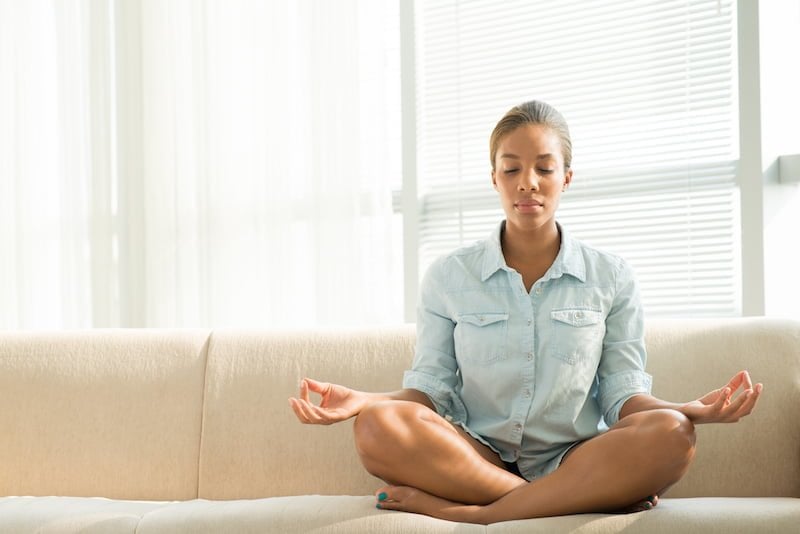5 Ways Meditation Can Help You Become a Better Parent
Parenting is a tough job. As parents, we are busy from the time our feet hit the floor in the morning until long after our little ones go to bed at night. An endless array of domestic chores, sport practices, homework, and childhood woes can wear down even the most saintly soul.
Fortunately, meditation provides an easily accessible tool, which has been proven to keep us healthy while decreasing stress and increasing joy. In fact, just practicing (you don’t even have to master) the art of meditation can help you become a better parent.

Meditation is a simple way to settle the ever-running inner dialogue that flows through our minds. As the activity of the mind settles, we can access our consciousness – sometimes referred to as “the still small voice.”
Meditation for Parents
Consciousness is the repository of awareness, peace, wisdom, and intuition. By regularly tapping into consciousness we can parent more from the heart and less from the head.
Meditation can help you develop the following heartfelt states.
Learning Non-Reactivity
Meditation itself is a practice of non-reactivity. We have a thought, but we don’t jump on board and ride that thought to gloom and doom. We experience a feeling, but we don’t create a story around it. We perceive a noise, but we return to the sound of our breath. Meditation provides a platform for connecting with the inner silent observer, irrespective of distractions.
This silent observer is an aspect of our own consciousness. By connecting with the silent observer, we change our relationship to thoughts, as well as to their ensuing feelings and emotions.
We learn that we are not victims of thought, but powerful creators of it. We begin to understand that we are capable of utilizing the energy and information contained within each thought if we will but pause and listen.
Learning to pause and listen to the information contained within thought is an invaluable parenting tool. From the toddler who destroys our great grandmother’s coffee table to the teenager who “forgets” to call when she stays out past midnight, there are countless opportunities to either react or inwardly listen.
By practicing non-reactivity in meditation we train ourselves to become better listeners which in turn helps us become more conscious creators. On a practical level, this translates into non-violent communication, increased intuition, and decreased stress.
Cultivating Mindfulness
Mindfulness simply means we are aware of the choices we are making in the moment. This kind of awareness helps us to be more purposeful in our parenting decisions. As parents, it is easy to fall into predefined roles, following unconsciously in the footsteps of our parents, society, or cultural norms.
Yet, by becoming more aware we are able to determine the one choice in any given situation, which will contribute toward the expansion of peace and love. As we slow down, tune in to our internal guidance system, and make the most loving choice available in any moment, not only will our children be able to grow into the fullness of their potential, we will too.
Developing Compassion
Meditation enlarges our sense of self. It teaches us to identify with the larger body of humanity. An expanding sense of self naturally leads to a more open heart. By stilling the mind, releasing ego identification, and expanding our awareness we are able to access our inner compassion. Researchers found that just eight weeks of daily meditation significantly increased the odds of meditators alleviating another’s pain. (source)
While compassion is at times a natural response to our children, there are other moments when it requires intentional development. Meditation helps us to have understanding for the little one who falls to the floor screaming when told that he cannot have his friend’s toy.
It helps us to feel empathy for the pre-teen who “borrows” our computer without asking and accidentally deletes the project that we have been working on (yes, that really happened to me). It stirs enough insight to reminds us that we, too, were once the teenager who told our parents that they just needed to mind their own business.
Perhaps, most importantly, meditation helps us to feel compassion toward ourselves when we have a less than ideal parenting moment. Compassion is so fundamental to mindful parenting that it might even be considered the parent’s most valuable tool!
Bringing Present Moment Awareness
Far too often, parents live in the future. In fact, from the time some babies are conceived they are being prepared for something in the future.
Parents play specific music in utero to enhance brain development, make sure their child attends the right pre-school so they can get into an elite elementary school, work to ensure that their child attends private high school which, of course, is the precursor to a predetermined college.
Yet, with so much living in the future, it is possible to miss the most important thing of all…your child. Present moment awareness helps us to really understand our children, to know what makes their soul come to life.
Meditation develops the quality of discernment so that we can distinguish between appropriate planning and vicarious living. It takes us away from a futuristic focus and plants us squarely in the only moment we ever have with our child…NOW. Deepak Chopra reminds us, “The best way to prepare for any moment in the future is to be fully present in the now.”
Deepening a Sense of Calm
If meditation did nothing else but calm our mind, it would be worth it. Dipping into the placid waters of peace allows us to think more clearly and act more efficiently. It is akin to bathing our minds. It cleans out the clutter that contributes to stress, discontent, and overwhelm.
By spending a few minutes each day in meditation, the remaining waking hours become infused with the fragrance of peace and calmness.
Within us is a sanctuary of peace to which we can retreat at any time. As we familiarize ourselves with this place then we are free to travel there when life feels overwhelming. With time, we learn to live always from this center of peace as we conduct our affairs in the world. Our own cultivation of peace will influence our children more than any other single factor.
At the end of our parenting journey we will look back and ask only a few questions:
- Did I love with my whole being?
- Did I set an example of peace?
- Did I help my child connect with her inner guide?
Meditation is the single practice that can help us to answer yes to each of these simple questions.

